M7U3译林牛津英语模块七第三单元Project学案
- 格式:doc
- 大小:33.50 KB
- 文档页数:3
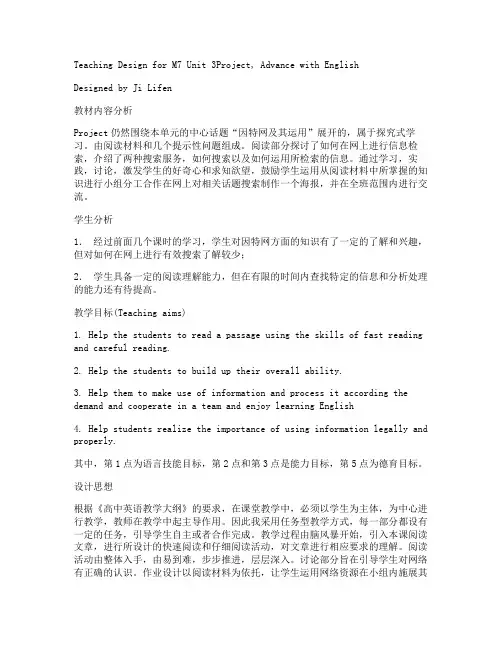
Teaching Design for M7 Unit 3Project, Advance with EnglishDesigned by Ji Lifen教材内容分析Project仍然围绕本单元的中心话题“因特网及其运用”展开的,属于探究式学习。
由阅读材料和几个提示性问题组成。
阅读部分探讨了如何在网上进行信息检索,介绍了两种搜索服务,如何搜索以及如何运用所检索的信息。
通过学习,实践,讨论,激发学生的好奇心和求知欲望,鼓励学生运用从阅读材料中所掌握的知识进行小组分工合作在网上对相关话题搜索制作一个海报,并在全班范围内进行交流。
学生分析1.经过前面几个课时的学习,学生对因特网方面的知识有了一定的了解和兴趣,但对如何在网上进行有效搜索了解较少;2.学生具备一定的阅读理解能力,但在有限的时间内查找特定的信息和分析处理的能力还有待提高。
教学目标(Teaching aims)1. Help the students to read a passage using the skills of fast reading and careful reading.2. Help the students to build up their overall ability.3. Help them to make use of information and process it according the demand and cooperate in a team and enjoy learning English4. Help students realize the importance of using information legally and properly.其中,第1点为语言技能目标,第2点和第3点是能力目标,第5点为德育目标。
设计思想根据《高中英语教学大纲》的要求,在课堂教学中,必须以学生为主体,为中心进行教学,教师在教学中起主导作用。
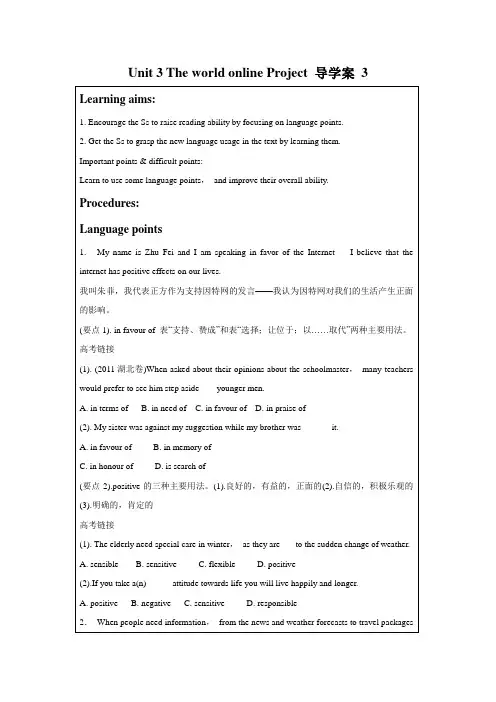
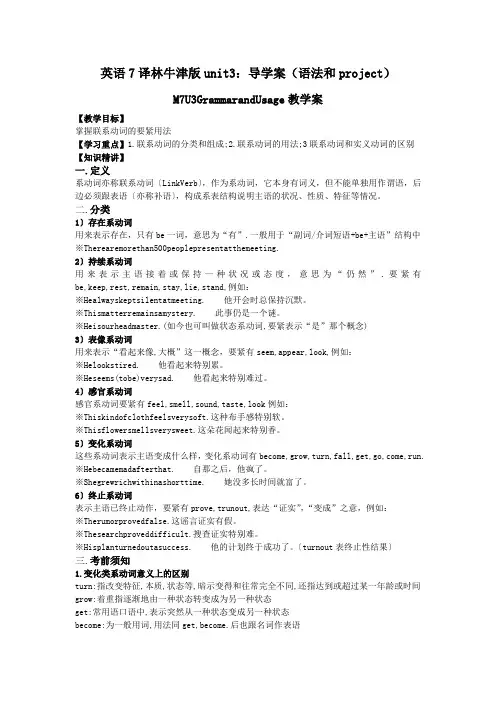
英语7译林牛津版unit3:导学案(语法和project)M7U3GrammarandUsage教学案【教学目标】掌握联系动词的要紧用法【学习重点】1.联系动词的分类和组成;2.联系动词的用法;3联系动词和实义动词的区别【知识精讲】一.定义系动词亦称联系动词〔LinkVerb〕,作为系动词,它本身有词义,但不能单独用作谓语,后边必须跟表语〔亦称补语〕,构成系表结构说明主语的状况、性质、特征等情况。
二.分类1〕存在系动词用来表示存在,只有be一词,意思为“有”.一般用于“副词/介词短语+be+主语”结构中※Therearemorethan500peoplepresentatthemeeting.2〕持续系动词用来表示主语接着或保持一种状况或态度,意思为“仍然”.要紧有be,keep,rest,remain,stay,lie,stand,例如:※Healwayskeptsilentatmeeting. 他开会时总保持沉默。
※Thismatterremainsamystery. 此事仍是一个谜。
※Heisourheadmaster.(如今也可叫做状态系动词,要紧表示“是”那个概念)3〕表像系动词用来表示“看起来像,大概”这一概念,要紧有seem,appear,look,例如:※Helookstired. 他看起来特别累。
※Heseems(tobe)verysad. 他看起来特别难过。
4〕感官系动词感官系动词要紧有feel,smell,sound,taste,look例如:※Thiskindofclothfeelsverysoft.这种布手感特别软。
※Thisflowersmellsverysweet.这朵花闻起来特别香。
5〕变化系动词这些系动词表示主语变成什么样,变化系动词有become,grow,turn,fall,get,go,come,run. ※Hebecamemadafterthat. 自那之后,他疯了。
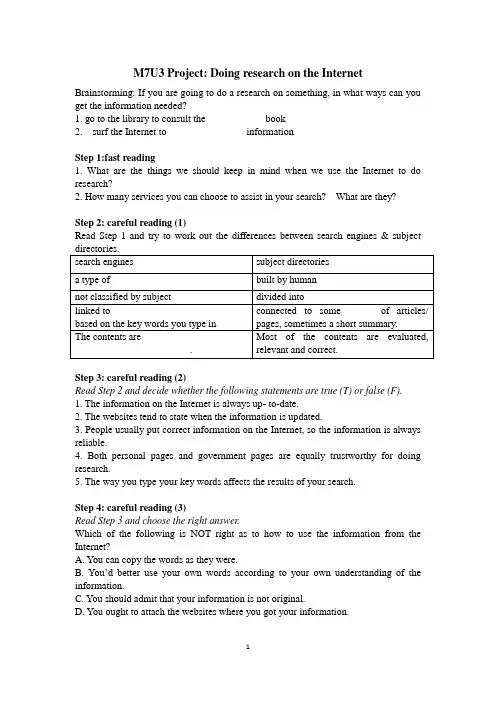
M7U3 Project: Doing research on the Internet Brainstorming: If you are going to do a research on something, in what ways can you get the information needed?1. go to the library to consult the ___________ book2. surf the Internet to _______________ informationStep 1:fast reading1. What are the things we should keep in mind when we use the Internet to do research?2. How many services you can choose to assist in your search? What are they? Step 2: careful reading (1)Read Step 1 and try to work out the differences between search engines & subjectStep 3: careful reading (2)Read Step 2 and decide whether the following statements are true (T) or false (F).1. The information on the Internet is always up- to-date.2. The websites tend to state when the information is updated.3. People usually put correct information on the Internet, so the information is always reliable.4. Both personal pages and government pages are equally trustworthy for doing research.5. The way you type your key words affects the results of your search.Step 4: careful reading (3)Read Step 3 and choose the right answer.Which of the following is NOT right as to how to use the information from the Internet?A. You can copy the words as they were.B. You’d better use your own words according to your own understanding of the information.C. You should admit that your information is not original.D. You ought to attach the websites where you got your information.Step 5: Sentences1.Sentences with non-finites (-ed/-ing/ to do)(L29) Being relevant and correct, though, does not equal being up to date.(L31). There are several things to take into consideration.(L40-41) Government pages or pages managed by organization and companies you trust are much better.(L54). To copy the words just as you found them is not only cheating, but also illegal. (L56). Then write your report, using your own words and making your own decisions about what it means.(L60). Follow these tips, and your time spent doing research on the Internet will be much worthwhile.2.Sentence analysis and translation(L6-7) Let’s start looking at the two services you can choose_______ to assist ___in your research:search engines and subject directories.(L11-12). These engines search the Internet for you based on the key words you type in____ choose web pages for you ________ contain the words you ask for.(L15-17) This requires you to be patient as ____ have to read the information to decide whether it is linked to ____you _____ are researching.(L41-42). _____ you are not sure about the information you find, consult other web pages to confirm___..(L46-48). ___ minus symbol ‘-’ means the same as ‘not’, ____if you want to learn about birds _____ you do not want ____ information about sparrows, you could type ‘bird-sparrow’.(L59-60). When you are finished, you should _____acknowledge____you got your data by attaching a list of the websites you got your information _____.3. Sentence pattern: Translation:(1)The higher the tree(is), the stronger the wind(is).你练得越多,说得就越好。
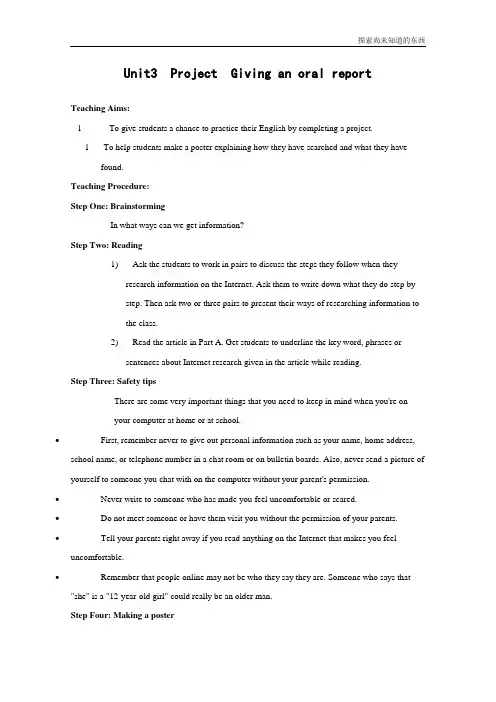
Unit3 Project Giving an oral reportTeaching Aims:l To give students a chance to practice their English by completing a project.l To help students make a poster explaining how they have searched and what they have found.Teaching Procedure:Step One: BrainstormingIn what ways can we get information?Step Two: Reading1) Ask the students to work in pairs to discuss the steps they follow when theyresearch information on the Internet. Ask them to write down what they do step bystep. Then ask two or three pairs to present their ways of researching information tothe class.2) Read the article in Part A. Get students to underline the key word, phrases orsentences about Internet research given in the article while reading.Step Three: Safety tipsThere are some very important things that you need to keep in mind when you're onyour computer at home or at school.•First, remember never to give out personal information such as your name, home address, school name, or telephone number in a chat room or on bulletin boards. Also, never send a picture of yourself to someone you chat with on the computer without your parent's permission.•Never write to someone who has made you feel uncomfortable or scared.•Do not meet someone or have them visit you without the permission of your parents. •Tell your parents right away if you read anything on the Internet that makes you feel uncomfortable.•Remember that people online may not be who they say they are. Someone who says that "she" is a "12-year-old girl" could really be an older man.Step Four: Making a poster1) Ask the students to work in groups to discuss the questions in Part B. They shouldchoose a topic to research on the Internet and then divide the work among the groupmembers.2) Ask each group to present their poster to the class. Other groups can give theircomments. Encourage students to decide which group had made the best use of theInternet and has found the true and accurate information.Step Five: Important phrases1. do research on2. the more… the more…3. keep in mind4. be based on5. ask for6. right away7. make a decision8. up to dateat the bottom of10. be careful about11. be (not) sure about12. make a difference13. search for14. belong to15. make a list of16. follow these tipsStep Six: Homework: Finish the poster。
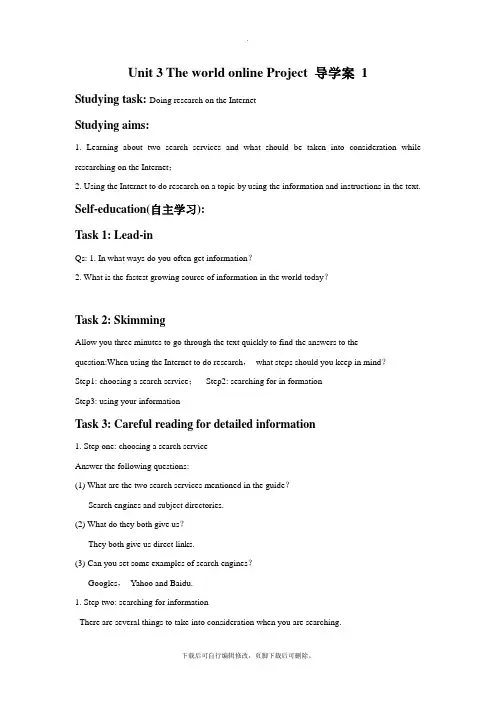
Unit 3 The world online Project 导学案1 Studying task: Doing research on the InternetStudying aims:1. Learning about two search services and what should be taken into consideration while researching on the Internet;2. Using the Internet to do research on a topic by using the information and instructions in the text. Self-education(自主学习):Task 1: Lead-inQs: 1. In what ways do you often get information?2. What is the fastest growing source of information in the world today?Task 2: SkimmingAllow you three minutes to go through the text quickly to find the answers to thequestion:When using the Internet to do research,what steps should you keep in mind?Step1: choosing a search service;Step2: searching for in formationStep3: using your informationTask 3: Careful reading for detailed information1. Step one: choosing a search serviceAnswer the following questions:(1) What are the two search services mentioned in the guide?Search engines and subject directories.(2) What do they both give us?They both give us direct links.(3) Can you set some examples of search engines?Googles,Yahoo and Baidu.1. Step two: searching for informationThere are several things to take into consideration when you are searching.What are they?a). Information gets old.b). People may put incorrect information on the Internet.c). The way you type your key words makes a difference.3. Step three: using your informationFill in the blanks:To copy the words just as you found them is not only cheating,but also not legal. So you should remember to:1) Write an _outline_ of the information you have found.2) Use your own _words_ and make your own _decisions_ about what it means.3) _Attach_ a list of the _websites_ you got your information from.Team work(合作探究): 重点短语、句子的理解和记忆A. Translate the following phrases into Chinese.1. keep--- in mind 把---记在心上,牢记2. do research on 对---做研究3. be classified by 被分类,被归类4. be linked to 与---有关5. comb through sth (for) 仔细搜寻6. up to date 最新的,时髦的7. take into consideration 考虑,考虑到8. get old 变老;过时9. at the bottom of 在---底部10. as a general rule 按照常规11. be sure about 对---确定,有把握12. make a difference 有影响,起重要作用13. search for 搜寻/索14. make decisions 做决定15. a list of ---的列表或清单16. follow these tips 遵循这些建议B. Language points1. The results of your search are divided into specific subject categories.(L23-24)divide … into …意为:__把---分成---__译:1). 全班分成几个小组讨论该题目的几个不同局部。
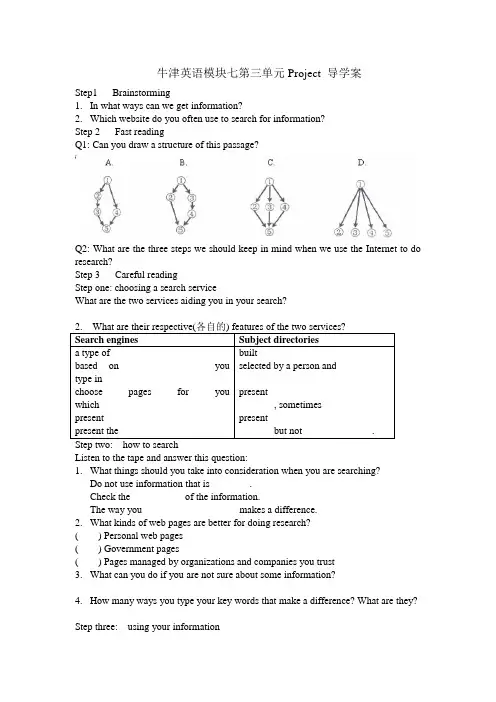
牛津英语模块七第三单元Project 导学案Step1 Brainstorming1.In what ways can we get information?2.Which website do you often use to search for information?Step 2 Fast readingQ1: Can you draw a structure of this passage?Q2: What are the three steps we should keep in mind when we use the Internet to do research?Step 3 Careful readingStep one: choosing a search serviceWhat are the two services aiding you in your search?_____________________________________________________________________Listen to the tape and answer this question:1.What things should you take into consideration when you are searching?Do not use information that is________.Check the __________ of the information.The way you ___________________makes a difference.2.What kinds of web pages are better for doing research?( ) Personal web pages( ) Government pages( ) Pages managed by organizations and companies you trust3.What can you do if you are not sure about some information?__________________________________________________________________ 4.How many ways you type your key words that make a difference? What are they? _____________________________________________________________________ Step three: using your information1.Can you copy the words found on the Internet and use them directly in yourarticles? Why not?___________________________________________________________2. What can you do when using the information that others wrote?___________________________________________________________Step four ConclusionFollow these _____, and your time spent doing research will be much more ___________. Happy searching!Step 4 Homework。

Unit 3 Project Doing Research on the InternetTeaching aims:Encourage students to practise their English by completing a project. Important &difficult points:1.Read an information sheet about Internet research.nguage points in the text.3.Students use what they have learnt to finish a project by working together。
Teaching procedures:Step 1 RevisionStep 2 Lead-in of the reading passage1. Ask students to work in pairs to siscuss the steps they follow when they research information on the Internet。
Ask them to write down what they do step by step.2. Ask two or three pairs to present their ways of researching information to the class。
Step 3 ReadingAsk students to read the article in Part A with the help of the following table.Comparison of the two search services:Step 4 Language points1.guiden.领路人,导游者,引导者,指南a guide book导游指南A guide led us around the city.向导带我们到市内各地去游玩。
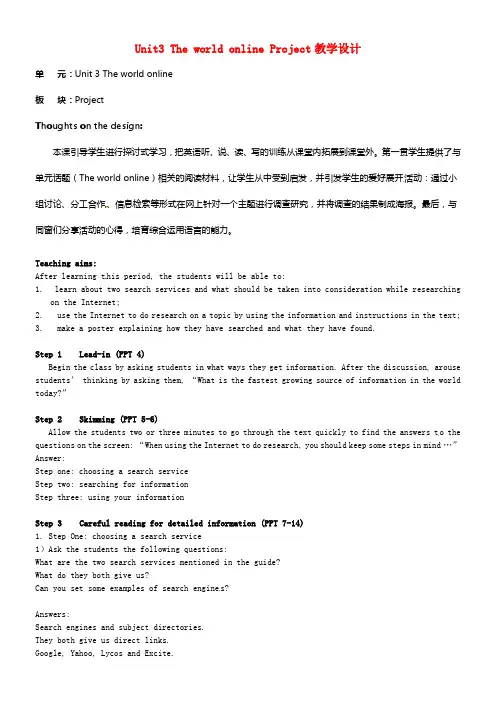
Unit3 The world online Project教学设计单元:Unit 3 The world online板块:ProjectThoughts on the design:本课引导学生进行探讨式学习,把英语听、说、读、写的训练从课堂内拓展到课堂外。
第一贯学生提供了与单元话题(The world online)相关的阅读材料,让学生从中受到启发,并引发学生的爱好展开活动:通过小组讨论、分工合作、信息检索等形式在网上针对一个主题进行调查研究,并将调查的结果制成海报。
最后,与同窗们分享活动的心得,培育综合运用语言的能力。
Teaching aims:After learning t his period, the students will be able to:1. learn about two search services and what should be taken into consideration while researchingon the Internet;2. use the Internet to do research on a topic by using the information and instructions in the text;3. make a poster explaining how they have searched and what they have found.Step 1 Lead-in (PPT 4)Begin the class by asking students in what ways they get information. After the discussion, arouse students’ thinking by asking them, “What is the fastest growing source of information in the world today?”Step 2 Skimming (PPT 5-6)Allow the students two or three minutes to go through the text quickly to find the answers t o the questions on the screen: “When using the Internet to do research, you should keep some steps in mind …”Answer:Step one: choosing a search serviceStep two: searching for informationStep three: using your informationStep 3 Careful reading for detailed information (PPT 7-14)1. Step One: choosing a search service1)Ask the students the following questions:What are the two search services mentioned in the guide?What do they both give us?Can you set some examples of search engine s?Answers:Search engines and subject directories.They both give us direct links.Google, Yahoo, Lycos and Excite.(2)True or false questions:Search engines are a type of computer program.Search engines present ev aluated contents because the information has been checked by a person. You need to be patient when using subject directories because the links go to the full articles or pages.The links of the search engines are not classified by subject.Subject directories not only present correct information, but also are up to d ate.Answers:T F F T F2. Step two: searching for information1)There are several things to take into consideration when you are searching …Answer:Information gets old.People put information on the Internet.The way you type your key words makes a difference.2)Find the right answer:(1)Where will many sites state the date?A. In the middle of the page.B. At the bottom of the page.C. At the front of the page.D. Usually on the right side.(2)According to the passage, why do we usually need to check the source of the information we find?A. Because the date is too old.B. Because we can’t surf on personal web pages.C. Because not every person bothers to read over their own writing and make corrections.D. Because we are afraid of virus.(3)Which of the following web pages is much better for doing research on the Internet?A. Personal web pages.B. Pages managed by organizations and companies yo u trust.C. Government pages.D. B and C.(4)According to t he passage, if you want to learn about swimming but you don’t w ant any information about swimm ing, you should type ______.A. sports swimmingB. “sports”- “swimming”C. “sports”+ “swimming”D. sports-swimmingAnswers:BCDB3)Step three: using your informationFill in the blanks:To copy the words just as you found them is not only cheating, but also not legal. So remember to:Write an _______ of the information you have found.Use your own _______ and make your own __________ about what it means.________ a list of the ______ you got your information from.Answers:outline; words; decisions; Attach; sitesStep 4 Language points (PPT15-19)A. Important phrases:1. do research on2. keep in mind3. be classified by4. be linked to5. make a decision6. be divided into7. a bunch of8. up to date9. take into consideration10. as a general rule11. be sure about12. make a difference13. search for14. belong to15. a list of16. follow these tipsB. Key words:1. keep ... in mind (= remember sth. firmly). It’s a good idea. I will keep it in mind.Translation:你要牢记,你是不是尽力会阻碍你的成绩。
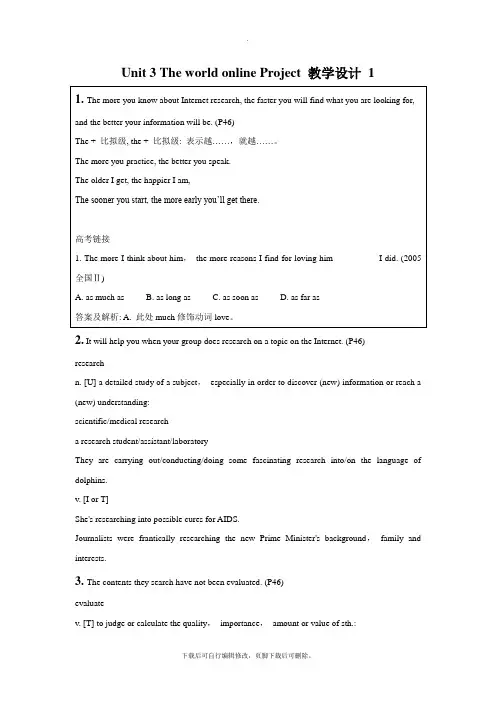
Unit 3 The world online Project 教学设计12. It will help you when your group does research on a topic on the Internet. (P46)researchn. [U] a detailed study of a subject,especially in order to discover (new) information or reach a (new) understanding:scientific/medical researcha research student/assistant/laboratoryThey are carrying out/conducting/doing some fascinating research into/on the language of dolphins.v. [I or T]She's researching into possible cures for AIDS.Journalists were frantically researching the new Prime Minister's background,family and interests.3. The contents they search have not been evaluated. (P46)evaluatev. [T] to judge or calculate the quality,importance,amount or value of sth.:It's impossible to evaluate these results without knowing more about the research methods employed.[+ question word] We shall need to evaluate how the new material stands up to wear and tear. 4. The links you obtain from the search engine go to the full articles or pages. (P46)obtainv.[T] FORMAL to get sth.,especially by asking for it,buying it,working for it or producing it from sth. else:to obtain permissionFirst editions of these books are now almost impossible to obtain.In the second experiment they obtained a very clear result.Sugar is obtained by crushing and processing sugar cane.v. [I not continuous] FORMAL (especially of a situation) to exist:Conditions of extreme poverty now obtain in many parts of the country.[5. This requires you to be patient as you have to read the information to decide whether it is related to what you are researching. (P46)requirev. [T] to need or make necessary:Please telephone this number if you require any further information.Skiing at 80 miles per hour requires total concentration.[+ object + to infinitive] Bringing up children often requires you to put their needs first.You are required by law to stop your car after an accident.[+ that] The rules require that you bring only one guest to the dinner.asadv. 象…一样;如同;一样;同样like;in the same wayHis face is as black as coal.I am not as tall as he is.It seemed to be as big as a house.He thought he could walk as quickly as his friend,but couldn't.I get up just as early as he does.as cold as iceas cool as a cucumberas good as goldas happy as a larkconj. 1) 当…的时候when;whileHe waved as the train left the station.As I was coming here,I met your brother.As a child he lived on a farm.We get wiser as we grow old.2) 和…一样;象;如in the same way asDo as I do.It is just as you like.We discussed our profession as all medical men do. It isn't so (as) easy as you think.This line is as long as that one.He doesn't speak as other people.3) 按照according toHe told his men to do as the boy asked.Do as you are told.It is as you told me.4) 表示比例、比拟等Two is to four as (what) eight is to sixteen.One is as light as the other is heavy.5) 因为;由于;鉴于becauseAs I was late,I hurried along.As it was raining,I stayed at home.As Li Pin was not well,I went there myself.As he wasn't ready,we left without him. Everybody likes him as he is kind and honest.6) 虽然;尽管;然而though;howeverYoung as he is,he knows a lot of things.Pretty as she is,she is not clever.Late as it was,they continued the work.Rich as he is,he is not happy.Cold as it was,they went on working.7) 被认为;作为considered asHe was famous as a soldier.He was hanged as a murderer.prep. 1) 以…为职业in the job ofMarion works as a journalist.2) 以…的资格;作为in the capacity of;considered asHe is famous as a physicist.I regard him as a guest.I've come here as a journalist.pron. 1) 象…那样的人(或事物) the same as;as... as;such... asHe is not such a fool as he looks.Is it the same lecture as tomorrow's?He is not the same man as he was.2) 由…知道(preceded by,or preceding a sentence) which factHe was a foreigner,as I knew from his accent.This elephant is like a snake,as anybody can see.高考链接1. Jenny was very sad over the loss of the photos she had shot at Canada,_________ this was a memory she especially treasured. (2006广东)A. asB. ifC. whenD. where2. __________,he talks a lot about his favorite singers after class. (2005重庆)A. A quiet student as he may beB. Quiet student as he may beC. Be a quiet student as he mayD. Quiet as he may be a student3. I feel that one of my main duties ______ a teacher is to help the students to become betterlearners. (2004广东)A. forB. byC. asD. with4. ______ is reported in the newspapers,talks between the two countries are making progress. (2004北京)A. ItB. AsC. ThatD. What答案及解析:1. 选A. 此句as 意为“因为〞。
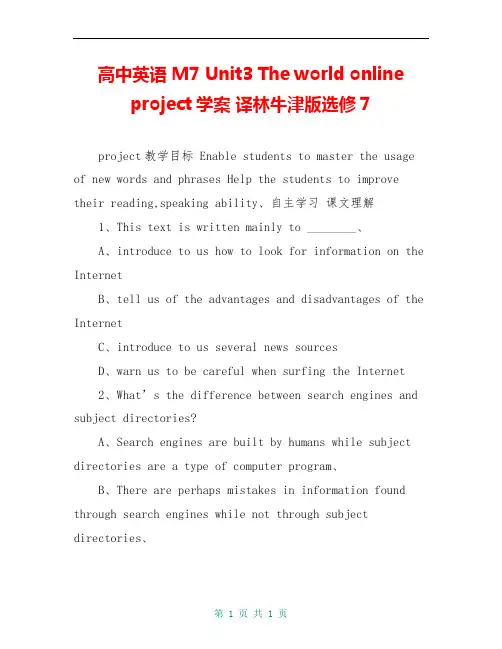
高中英语 M7 Unit3 The world online project学案译林牛津版选修7project教学目标 Enable students to master the usage of new words and phrases Help the students to improve their reading,speaking ability、自主学习课文理解1、This text is written mainly to ________、A、introduce to us how to look for information on the InternetB、tell us of the advantages and disadvantages of the InternetC、introduce to us several news sourcesD、warn us to be careful when surfing the Internet2、What’s the difference between search engines and subject directories?A、Search engines are built by humans while subject directories are a type of computer program、B、There are perhaps mistakes in information found through search engines while not through subject directories、C、Using subject directories takes more time than search engines、D、Google is an example of subject directories、3、Which of the following doesn’t need considering when you are looking for information on the Internet?A、The date of the webpage、B、Who wrote the webpage、C、Typing the key words skilfully、D、How to download the needed information、4、From “Step three” we know that ________、A、we can download any needed information we have found on the InternetB、we shouldn’t copy the original words on the InternetC、we must pay the authors who wrote the information we needD、it’s not easy for us to find needed information单词检测1、n、________终端;终点 ________网状物,网络________资格 ________类别________改正 ________加号________减号2、v、________分类 ________打扰________承认;感谢3、adj、________具体的;特定的 ________紧密相关的;有价值的短语检测1、________、、、in mind记住,牢记2、________ word关键词3、be divided ________分为……,分成……4、________ that basis在此基础上,以此为依据5、take、、、________ consideration考虑(到)6、________ a general rule一般情况下7、be sure ________对……有把握;对……肯定8、search ________搜索,搜寻,寻找当堂反馈1、He is ____________________________________、(acknowledge)他被认为是最杰出的钢琴家之一。
Useful expressions1.有…的名声、声誉_______________________2. 把人们运送到市中心_________________3.引起了难以置信的堵车____________________4.批准建设地铁________________________5.需要筹集大量的资金______________________6.连接________________________________7.蒸汽机__________________________________8.每隔…距离/时间_____________________9.加速…的节奏___________________________10.承担起改善地铁系统__________________ 11.获得…的所有权________________________ 12.被置于…的管辖下____________________ 13.有一些特殊用途________________________ 14.起到了防空洞的作用__________________ 15.指导对空袭的防御______________________ 16.政府行政会议室______________________ 17.乘坐地铁______________________________ 18.纪念她成为女王25周年_______________ 19.售票处________________________________ 20.旅行卡______________________________Multiple choices1. We’ll go throug h the test of vocabulary while studying English. Try toyours by reading.A. expandB. enlargeC. extendD. increase2. ---- What a day! I ________ escaped from a car crash, then I was told that I had my car stolen!A. suddenlyB. immediatelyC. mostlyD. narrowly3. She now has ____________ over the people who used to be her bosses.A. authorB. authorityC. awfulD. power4. The increasing number of cars on the road _________ traffic. This is the re ason why we can’t get here on time.A. chokes backB. chokes downC. chokes offD. chokes up5. The fence marks the __________ between my land and hers.A. limitB. lineC. edgeD. boundary6. Should it rain tomorrow, we would have to ________ the visit to the Yangpu Bridge.A. suggestB. postponeC. opposeD. disobey7. China will ______ greater international responsibilities. This not only meets the expectations of the international community, but also serves China’s own interests.A. guaranteeB. sponsorC. concentrateD. undertake8. The famous orchestra, which was composed by the four young musicians, is _______ into four parts according to the folk songs.A. picked upB. given upC. turned upD. split up9.---Did you watch the football match last night?---No,there was sth wrong with my TV.It couldn`t ____ any progremmes.A.send upB.get upC.pick upD.take up10.It was owing to luck ___ judgement ___ the driver succeed in avoiding an accident.A.better than,whenB.rather than,thatC.other than ,whenD.more than ,which 11.I thought I'd ________ while I was passing.A.drop in B.drop out C.drop off D.drop behind12.In daily life, we often use body language to ________ extra meaning.A.broadcast B.predict C.convey D.e-mail13.They have planned to ________ the two areas by telephone.A.join up B.pick up C.take up D.link up 14.Trees are standing ________ intervals along the street and they provide shade for people in summer.A.for B.in C.on D.at15.Under the new schedule, teachers of primary and secondary schools must ________each class on time instead of adding extra lessons.A.cancel B.advocate C.postpone D.dismissFill in the blanks1 The old couple want to keep steady rather ________ (enlarge) their business.2 Last week, only two people came to look at the house, neither of ________ wanted to buy it.3 ——Shall we go to see the new film?——Why ________? Let’s make it tonight.4 As we know, language is one of the significant means for mankind ________ (convey) thoughts and feelings.5 Without the games, he expects the bar’s weekday sales to drop ________ by 7%.6 The two spacecraft will link ________ with each other in orbit.7 To their surprise, the room was choked up ________ useless old furniture.8 Mr. Collins undertook ________ (look) after the children so that his wife could go to thhe fit club with two of her friends.9 He decided to postpone ________ (buy) thhe house because his mother was ill, which cost him a lot of money.10 When the cooking class changed to Tuesday, I had to drop out so that I could pick ________ my daughter from her piano lesson.11. Only _______ (take) according to the directions can the medicine be quite effective.12. The man we followed suddenly stopped and looked around as if____ (see) whether he was going in the right direction.13. —Is there any possibility of the film____ (try) out in Paris International Festival?—Not in the least, because audience generally think little of it.14. —Hi, Mary. Would you like to go to the concert this evening?—Sorry, Tom. _______ (not prepare) tomorrow’s lessons, I have no time to go out with you.15. —O’Neal works hard.—So he does. He is often seen _____ (sweat) heavily before his teammates have even arrived at practice.1. have the distinction of2. convey people to and around the city center3. cause unbelievable traffic jam4. give aproval to the construction of the Underground5.require raising a large amount of money6. link up7. steam engine8.at regular intervals9. accelerate the pace of 10. undertake improving the system 11. obtain ownership of 12. be placed under the authority of 13. have some unusual uses 14. function as bomb shelters 15. direct the defence against air attacks 16. meeting rooms for the asministration of gobernment 17. travel on the underground 18. in honor of the 25th anniversary of her becoming the queen 19. ticket office 20 travel card1-10 BDBCD BDDCB 11-15ACDDD1 enlarge2 whom3 not4 to convey5 off6 up7 with8 to look9 buying 10 up11taken 12 to see 13 being tired 14 Not having prepared 15sweating。
英语高二译林牛津修7unit3金牌教案(1)—project Unit3ProjectDoingResearchontheInternetTeachingaims: EncouragestudentstopractisetheirEnglishbycompletingaproject.Important&difficultpoints:1.ReadaninformationsheetaboutInternetresearch.nguagepointsinthetext.3.Studentsusewhattheyhavelearnttofinishaprojectbyworkingtogether. Teachingprocedures:Step1RevisionStep2Lead-inofthereadingpassage1.Askstudentstoworkinpairstosiscussthestepstheyfollowwhentheyresearchinformatio nontheInternet.Askthemtowritedownwhattheydostepbystep.2.Asktwoorthreepairstopresenttheirwaysofresearchinginformationtotheclass.Step3Reading AskstudentstoreadthearticleinPartAwiththehelpofthefollowingtable. Comparisonofthetwosearchservices:Step4Languagepoints1、guiden、领路人,导游者,引导者,指南aguidebook导游指南Aguideledusaroundthecity、向导带我们到市内各地去游玩。
AGuidetoEnglishGrammar《英语语法入门》vt、指导,支配,治理,带领,操纵vi、任向导Heguidedusthroughthenarrowstreetstothesupermarket.他领着我们穿过小街到那超市。
英语译林牛津版选修7Unit3:导学案(Project)Project Doing research on the Internet【阅读引入】阅读理解。
阅读下列短文,从每题所给的四个选项(A、B、C和D)中,选出最佳选项。
Many traffic jams leave drivers puzzled as they finally reach the end of a tailback to find no visible cause for their delay.Now,a team of mathematicians have found the answer by developing a model to show how major delays occur on our roads,with no obvious cause.The model showed that a driver,slowing down below a critical speed(临界速率)when reacting to unexpected events,forces the car behind to slow down further and the next car back to reduce its speed still further.The result of this is that several miles back,cars would finally come to a stop,with drivers unaware of the reason for their delay.The model predicts that this is a very typical situation on a busy highway(above 15 vehicles per km).The jam moves backwards through the traffic creating aso-called “backward travelling wave”,which drivers may encounter many miles upstream,several minutes after it was caused.Drivers and p olicy-makers have not previously known why jams like this occur,though many have put it down to the sheer volume of traffic.While this clearly plays a part in this new theory,the main issue is around the smoothness of traffic flow.According to the model,heavy traffic will not automatically lead to jams but can be smooth-flowing.This model takes into account the time delay in drivers’reactions,which leads to drivers’ braking more heavily than would have been necessary if they had identified and reacted to a problem ahead a second earlier.When a driver taps the brake,the traffic may come to a full standstill several miles behind.It really matters how hard a driver brakes—a slight braking from a driver who has identified a problem early will allow the traffic flow to remain smooth.Heavier braking,usually caused by a driver reacting late to a problem,can affect traffic flow for many miles.1.From the passage,we learn that________.A.the new theory lacks evidence and is not convincingB.driving at low speed leads to traffic jamsC.many drivers don’t know how to deal with unexpected eventsD.drivers are often unaware of the reason why a traffic jam happens2.Which of the following is NOT included in the new theory?A.The traffic speed. B.The width of roads.C.The volume of traffic. D.The reaction time.3.Traffic jams can be avoided when________.A.mathematicians develop a modelB.drivers react to problems earlyC.there is a “backward travelling wave”D.there is a visible cause of the delay4.The underlined word “this” in the third paragraph refers to________.A.the “backward travelling wave”B.the smoothness of traffic flowC.the volume of trafficD.the model developed by a team of mathematicians【参考答案】1—4、D B B C General introductionThis section is designed to give you a chance to practice your English by completing a project. First, you can read an information sheet about Internet research to make you know more about how to do research on the Internet and how to look for the information needed. Then you will make a poster explaining how you have searched and what you have found. Part A: Reading1. Internet has become part of people’s life and there have been an argument about the effects of it. What’s your opinion? How do you make use of it?When you research information on the Internet, what do you do step by step? Please write your steps down.2. Please read the article in Part A and underline the key words, phrases or sentences about Internet research at the same time. Then try to compare the two search services. Search engines Subject directories1 2 3 4 51 2 3 43. Present your poster to the class.【知识精讲】1.keep in mind 记住,牢记※Keep in mind that you'll have to practice economy.(1) Fred, who had expected how it would go with his daughter , had a great worry _ _ his mind.A. onB. inC. withD. at(2) ---Do you mind my smoking here?----________________.A. No, thanksB. No good ideaC. Yes, pleaseD. Yes ,betternot(3) The old pictures _______ his childhood to his mind.A. keptB. broughtC. hadD. put (4) 我改变了主意回了家而没有去邮局。
主备人:审核人:用案人:用案时间:NO.课题: Module7 Unit3 〔第 4 课时〕学习目标学习重点学习难点课堂类型1. Pronounce and memorize the vocabulary from “specific 〞to “acknowledge 〞.2. Master the usage of these words “bother, acknowledge & relevant. 〞 The pronunciation and memory the vocabulary from “specific 〞to “acknowledge 〞.. The usage of the words: bother, acknowledge & relevant.. Vocabulary 新授课总课时数4 periods 学习过程用案人个案补充 【问题导引】一、词汇知识〔拼读、记忆P78 specific 到 acknowledge 局部单词后完成〕1.___________(n.) 类别,种类2.___________(adj.)紧 密 相 关 的 , 切 题 的 ; 有 价 值 的 , 有 意 义 的_________(n.) 关联,相关3.___________(vi.&vt.)花费时间、精力(做某事 );打搅,给某人造成麻烦4.___________(n.) 改正,修正,纠正______________(v.) 纠正,修正5.___________(n.) 终端,终端设备;终点〔adj.〕末端的,末梢的6.___________(vt.)成认,认可;感谢7.___________(n.) 目录; 号码簿;公司名录8.___________(vt.)宣称,断言;索取,认领〔n.〕声明,索款,索赔9. ____________(n.) 提纲,概要10. ___________(n.) 麻雀11. ___________(n.) 加号 ___________(adj.) 零度以上的12. ___________(n.) 减号 ___________(n.) 零度以下的二、重点单词用法学习1. relevant adj. 严密相关的,切题的;有价值的,有意义的 irrelevantadj. 无关的;不切题的be relevant/related/linked to 与⋯⋯有关be irrelevant to 与⋯⋯不相关have no relevance to 与⋯⋯没有关系① The criminal ,as well as some ________people ,was arrested by the policeyesterday.A. relevant B. Skilled C. releasedD. lucky②The secretary should have all the ________documents ready before the meetingbegins.A. concerning B. Respecting C. relevant D. regarding2. bother vi.& vt. 花费时间、精力 (做某事 );打搅,给某人造成麻烦n. 麻 烦bother doing/to do sth. 费事 /费心做某事can't be bothered to do sth. 不想费心做某事bother sb.to do sth. 麻烦某人做某事bother about/with sth. 为⋯⋯费心,花费时间、精力做某事 bothersb. with/about sth. 麻烦某人做某事It bothers sb. to do sth.做某事使某人不安It bothers sb. that... 令人烦恼的是⋯⋯① (2021 辽 )— I ’m afraid you have the wrong number. — Sorry!____.A. See you laterB. I didn ’tknow thatC. Hold on, pleaseD. I hope I didn ’tbother you②(2021 津) — I need to advertise for a roommate for next term.— ____? Mary is interested.3.acknowledge vt. 成认,认可;感谢acknowledge that ...成认⋯⋯acknowledge (doing/having done) sth.成认 (做了 )某事acknowledge sth./sb. to be/as ...认为⋯⋯是⋯⋯It is generally/widely acknowledged that ...⋯⋯是大家公认的/ 人们普遍认为⋯⋯①We ______with thanks your timely aid when we were in trouble.A. attributedB. knowledgeC. acknowledgedD. promised②is widely acknowledged thatthere is life, there is hope.A. It; whetherB. As; whetherC. As; whereD. It; where【检测】三、完成句子1. 他有两名助手听他调遣。